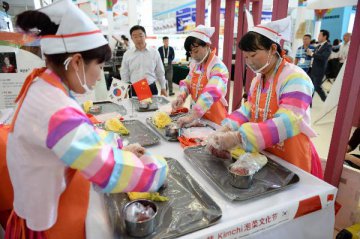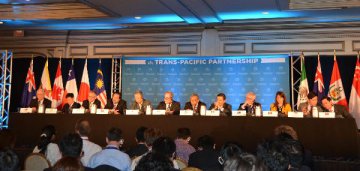
Parties to the Trans-Pacific Partnership (TPP) have reached an agreement on Oct. 5, agreeing to significantly reduce investment and trade barriers and establish new business rules. The TPP covers nearly 40 percent of the global economic output, including 30 chapters such as investment, service, e-business, government procurement, intellectual property right, state-owned enterprises, labor and environment. China is excluded in the TPP negotiation. What will be the effect of the signing of the TPP on four major industries, including the pharmaceutical and heavy equipment, in China?
Automobile industry
Agreement contents: According to the TPP agreement, the U.S. will cancel the 2.5 percent tariffs on the import of Japanese vehicles in 25 years. Japanese automobile manufacturers and vehicle components manufacturers will benefit most as they can enter into the U.S., the biggest export market in the industry, with even lower cost.
Expert comments: Chinese automobile industry is mainly driven by the domestic demand. The export of complete vehicles accounts for a small proportion and its main markets have been under fluctuation. Even if Chile, Vietnam and Peru turn to vehicles from the U.S. and Japan with zero tariffs, it will have limited effects on the export of complete vehicles of China.
Dairy industry
Agreement contents: Australia and New Zealand are among the participants of the TPP negotiation. According to the TPP rules, multilateral free trade agreements will affect the export of products made in China in short term. Relevant TPP countries can enjoy a preferential zero tariff treatment.
Expert comments: At least one third of the dairy products exported by New Zealand flow to the Chinese market while the remaining to Middle East, India, Africa and the U.S. China is the biggest market of New Zealand and New Zealand is unlikely to breach the free trade agreement signed with China before as it enters the TPP.
Electronic products
Agreement contents: 12 countries, including the U.S., Japan, New Zealand, Vietnam and Malaysia, signed the TPP, which may affect the manufacturing of electronic products in China.
Expert comments: Zhou Nan, deputy secretary-general of the household appliance branch of the China Chamber of Commerce for Import and Export of Machinery and Electronic Products, believes that TPP countries have limited effect on the household appliance industry of China as they produce household appliances in China. It may have minor effects only on the panel industry. But China is advancing the China-South Korea Free Trade Zone and the zero tariffs is an irreversible trend. The protection on national industry is only temporary and will not last long. With the updating of the panel industry, LG is focusing on the OLED. As a result, the TPP has limited effect on the household appliance industry.
Textile industry
Agreement contents: The trade among the 12 members of the TPP, including the textile trade between Vietnam and the U.S., will enjoy zero tariffs after it is implemented, which will improve the competitiveness of Vietnamese textiles.
Expert comments: The TPP agreement, including the elimination of tariffs and the improvement in the competitiveness of the textile industry, will inject strong momentum into the Vietnamese textile industry. It will also benefit Chinese textile companies with plants in Vietnam.
(Translated by Star Zhang)





















Latest comments